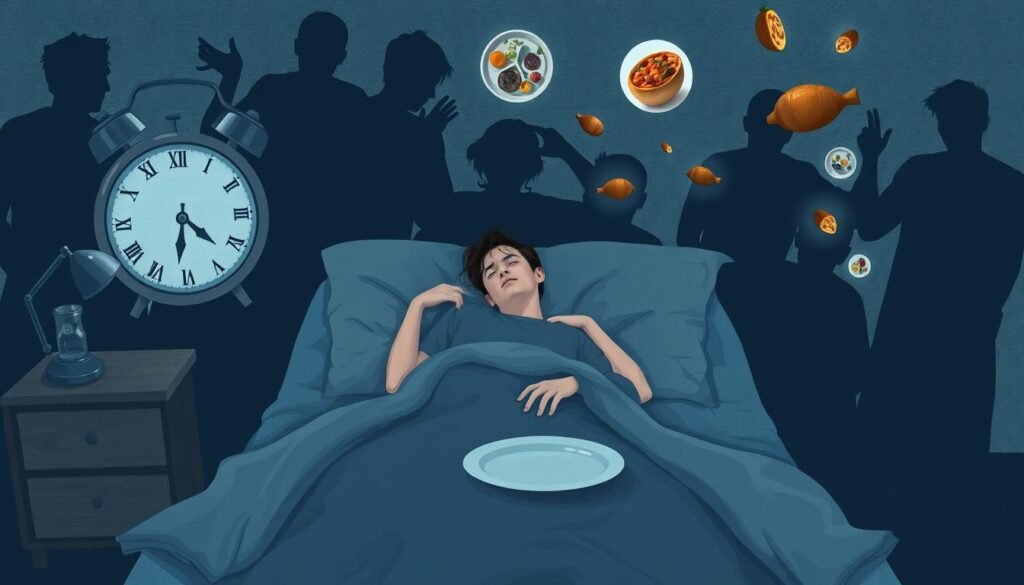More than two-thirds of adults in the United States are overweight or obese. This has led many to try diets like intermittent fasting. The 16:8 method is particularly popular for its ability to manage weight and improve sleep quality. Studies show it might help reinforce our body’s natural clock, leading to better rest. As people try this eating plan, it’s important to understand how fasting affects sleep and overall health.
This article will cover the pros and cons of intermittent fasting, with a special focus on how it relates to sleep. We’ll look into how the timing of meals impacts our sleep cycle. Plus, we’ll offer tips for better sleep while fasting. By understanding how to balance fasting with a healthy sleep schedule, readers can enjoy more restful nights.
Key Takeaways
- Over two-thirds of U.S. adults face obesity, prompting interest in intermittent fasting methods.
- The 16:8 fasting approach limits eating to an 8-hour window, impacting sleep quality positively.
- Intermittent fasting can improve levels of human growth hormone, enhancing recovery and sleep.
- Meal timing directly influences hormone production tied to appetite and sleep, making it crucial for success.
- Staying hydrated and choosing nutrient-dense foods during eating windows supports energy and rest.
What Is Intermittent Fasting?
Intermittent fasting is an eating plan that cycles between eating and fasting times. It includes different methods, like the 16:8 method. With this method, you fast for 16 hours and eat during an 8-hour window. It’s popular for its simple yet effective way to manage weight and improve health.
When you fast, your body starts using fat for energy, not just sugars. The 16:8 method isn’t just for losing weight. It also helps fix cells and makes your body better at using insulin.
What makes intermittent fasting attractive is how it can fit into your life. You can set your fasting times to match your schedule. This makes it easier to stick with over time.
Starting intermittent fasting can be tough. Some people might feel hungrier than usual or have mild headaches at first. But, these issues usually go away as your body gets used to fasting. Overall, intermittent fasting is a powerful way to eat smarter and improve your health.
The Origins and Popularity of Intermittent Fasting
Fasting has been part of cultures worldwide, linking to various historical fasting practices. These practices have roots in religion and aimed at deepening the bond between body and spirit. Today, the popularity of fasting has soared, with a focus on health benefits backed by nutritional science.
Figures like Michael Mosley have played a big role in bringing fasting into the limelight. He promotes intermittent fasting, sparking interest in its health advantages. This has made many people try modern fasting methods, such as the 16:8 technique, for better health and weight loss.
Insomnia affects a huge chunk of adults, making people rethink their eating schedules. Studies suggest that poor eating habits can upset our metabolic and hormonal balance. Eating in tune with our circadian rhythms can boost both our health and our sleep quality. for those looking deeper, this research on nutrition and exercise’s impact on circadian is very informative.
Combining ancient traditions with new health insights makes fasting a hot topic today. It’s praised for improving blood sugar control and possibly bettering sleep. This makes intermittent fasting a top choice for those focused on their well-being.
Benefits of Intermittent Fasting for Sleep
Intermittent fasting has many benefits of fasting beyond just controlling weight. It can greatly improve sleep quality, which is crucial for overall health. The method helps adjust circadian rhythms, managing our sleep and wake cycles, metabolism, and hunger.
By fasting intermittently, our body clocks sync up better. This makes our brain and stomach clocks work together well. Such syncing helps us sleep deeper and more soundly. People who skip eating for certain hours see better REM sleep and don’t wake up as much at night. This makes their sleep feel more refreshing.
Starting intermittent fasting might disrupt sleep at first. This rough patch usually goes away after 3 to 7 days. Once over this hump, many say their sleep gets much better. With ongoing fasting, they experience less insomnia and get more sleep overall.
| Aspect | Impact of Intermittent Fasting |
|---|---|
| Improved REM Sleep | Enhances cognitive functions and emotional regulation. |
| Reduced Nighttime Awakenings | Leads to uninterrupted sleep and deeper rest. |
| Bodily Adaptation | Facilitates better sleep quality post-adjustment phase. |
| Circadian Rhythm Alignment | Promotes natural sleep-wake cycles. |
How Intermittent Fasting 16:8 Affects Your Sleep Cycle
The 16:8 intermittent fasting method greatly changes how you sleep. It does this by affecting your body’s internal clock and when you eat. Sticking to an 8-hour eating window helps align your meals with your body’s natural rhythms. This can lead to better sleep, mainly if you eat earlier in the day. You’ll find it easier to enjoy a peaceful night’s sleep.
Understanding Your Circadian Rhythms
Your body’s internal clock is run by circadian rhythms. These rhythms control when you wake up, release hormones, and perform other key functions. Fasting can improve these internal cycles. Experts have found that not eating before sleeping can link your digestion with your brain’s clock. This can create a pattern of longer and more consistent sleep, boosting your health.
Impact of Meal Timing on Sleep Quality
When you eat affects how well you sleep. With a regular eating schedule, like with 16:8 fasting, your body’s metabolism adjusts. Eating late can mess up your sleep, causing trouble falling asleep or staying asleep. Choosing to eat earlier helps avoid these issues. It leads to fewer sleep interruptions and better rest overall.
Intermittent Fasting 16:8 Insomnia: What You Need to Know
The link between intermittent fasting and insomnia isn’t simple. Some who try the 16:8 method sleep better. Yet, others find their sleep gets worse. Studies show cutting calories can drop melatonin levels by 20% in just 2-7 days. This decrease in melatonin might be why some struggle with sleep during fasting.
When people start fasting, they switch to using ketones for energy. This change can upset sleep for a while. But there’s not much research on how fasting affects sleep. Adding about 50 grams of carbs daily could ease fasting sleep issues. Medium-chain triglycerides (MCT oil) also help by supplying ketones for better sleep.
Reports differ on fasting and sleep effects. Some research says it helps align our sleep cycles and hormone levels. Yet, others find low calories raise stress hormones, making sleep hard. It’s crucial to eat enough during eating periods to keep sleep steady.
Even when fasting, we need 7-9 hours of sleep to be at our best. Eating carbs at dinner, cutting out screens before bedtime, and using white noise can all improve sleep. Knowing more about intermittent fasting helps tackle its sleep challenges. For deeper insights, check out this expert analysis. Also, for sleep-related conditions, here’s a detailed resource.
Potential Causes of Insomnia During Intermittent Fasting
Insomnia can be a challenge with the intermittent fasting 16:8 method. Various factors can cause sleep issues during this diet. It’s vital to understand hunger effects and hydration impact to help avoid sleep problems.
Hunger and Cortisol Levels
When you’re fasting, you might feel hungrier. This can make your body’s stress hormone, cortisol, go up. High cortisol can make sleeping tough, either getting to sleep or staying asleep all night. Knowing the link between hunger effects and stress can help manage sleep issues during fasting.
Hydration and Dehydration Effects
Not drinking enough water is another reason for insomnia while fasting. People often drink less during their eating periods, which causes dehydration. Dehydration can lead to feeling dizzy, tired, and headaches. These can mess with the quality of your sleep. That’s why it’s crucial to drink plenty of fluids to improve sleep during fasting.

| Insomnia Causes | Effects | Mitigation Strategies |
|---|---|---|
| Increased Hunger | Higher cortisol levels lead to disrupted sleep | Incorporate healthy snacks in the eating window |
| Dehydration | Dizziness, fatigue, headaches | Increase water intake during and outside eating windows |
| Poor Meal Timing | Upset stomach, difficulty falling asleep | Avoid heavy meals close to bedtime |
Tips for Better Sleep While Practicing Intermittent Fasting
People who follow intermittent fasting often look for ways to sleep better. With some good tactics, one can improve sleep while sticking to a fasting plan. To do this, focus on when you eat and how you prepare for bed.
Best Eating Window Strategies
Choosing the right time to eat is key for good sleep. If you’re on a 16:8 fasting plan, eating between noon and 8 p.m. is a good idea. It gives your body time to digest food before you go to bed.
- Eat at least three hours before bed to avoid tummy troubles.
- Make sure your meals have enough protein and fiber. This will help you feel full and keep hunger away while you fast.
- Stay away from caffeine before bed as it can make it hard to sleep, especially when you’re fasting.
- Drink plenty of water during the day, but cut down before bedtime to reduce waking up at night.
Ideal Pre-Sleep Routine
Having a calming routine before bed can make a big difference in sleep quality. It tells your body it’s time to slow down and get ready for sleep.
- Make your room relaxing by dimming lights and keeping it quiet an hour before sleep.
- Try calming activities like reading, stretching, or meditation to get your mind and body ready for sleep.
- Avoid bright screens and exciting content before bed as they can mess with your sleep cycle.
- If you get hungry before bed, eat a light snack like nuts or yogurt, but stick to your fasting schedule.
Natural Sleep Aids and Techniques
Many people look for ways to sleep better naturally. They find options like binaural beats and deep sleep methods. These help those with sleep troubles, including during fasting periods.
Binaural Beats for Insomnia
Binaural beats work by playing different sounds in each ear. This creates a third tone in the brain. It’s a type of sound therapy that encourages relaxation and better sleep cycles. Studies show using binaural beats nightly can really help sleep.
This method may also ease anxiety. It helps people fall asleep faster. Using sound, it creates a peaceful space perfect for sleeping.
Deep Sleep Induction Methods
There are also deep sleep methods to try. These include guided imagery, muscle relaxation, and easy yoga. They can lead to deeper sleep. Adding these to your bedtime routine might improve your sleep. This is especially true when fasting.
Pairing binaural beats with these practices can be powerful. They relax the mind and get the body ready for deep sleep.

The Role of Nutrition in Sleep Quality
The link between what we eat and how well we sleep is important for our health. Eating right can help or hurt our sleep and well-being. It’s key to know which foods help us sleep better and which to avoid.
Types of Foods to Include in Your Diet
Eating the right foods can boost your sleep quality. Choose lean proteins, whole grains, and fruits. For instance, chicken or fish has tryptophan, which helps sleep.
Whole grains help tryptophan work better, making it easier to relax at night. Fruits like bananas and cherries give you melatonin, helping control sleep.
Foods to Avoid Before Bedtime
Some foods can mess up your sleep. Avoid high-sugar snacks and caffeinated drinks before bed. They can make sleeping tough.
Foods loaded with saturated fats or processed stuff may harm your sleep too. For those fasting, eat early to avoid discomfort at night. For more on stress and sleep, check this resource.
| Food Category | Good Options | Poor Options |
|---|---|---|
| Proteins | Lean meats, fish, tofu | Processed meats, fried foods |
| Carbohydrates | Whole grains, quinoa | White bread, pastries |
| Fruits | Cherries, bananas | High-sugar snacks |
| Drinks | Herbal tea, water | Caffeinated drinks, soda |
Changing what you eat can make your sleep much better. Getting the balance right helps you stay healthy and eat right.
Understanding the Link Between Stress and Sleep
Stress and sleep have a complicated relationship, especially when starting intermittent fasting. Getting used to new eating habits can raise stress. This, in turn, might worsen sleep. Increased cortisol, the stress hormone, makes it hard to fall asleep. It can also mess up our normal sleep patterns.
Effects of Intermittent Fasting on Stress Levels
Studies show intermittent fasting might cause sleep issues at first. Beginners often see their cortisol rise. This makes them alert at night. But this problem usually goes away after 3 to 7 days. During this time, falling asleep might be tough as the body gets used to fasting.
After adjusting, though, fasting helps set our internal clock straight. This improves sleep and lowers stress.
Relaxation Music and Sleep Therapy
For those wrestling with stress and sleep, relaxing tunes can be a big help. Calming music lowers the heart rate and cortisol. This makes it easier to sleep. Sleep therapy, like guided imagery or meditation, also fights anxiety.
These methods work well with intermittent fasting. They make the whole process smoother and boost sleep quality.

When to Consult a Professional
Knowing when to get help for insomnia and fasting is key to staying healthy. Many people fight insomnia symptoms. This fight can get harder with fasting. Knowing the signs for when to get professional help is crucial.
Recognizing Chronic Insomnia Symptoms
Chronic insomnia shows up in different ways, such as:
- Difficulty falling asleep
- Frequent awakenings during the night
- Waking up too early and not being able to go back to sleep
- Daytime fatigue or sleepiness
- Difficulty concentrating or focusing throughout the day
If you have these issues, you should consult a professional. They can make a plan to help you sleep better.
Medical Conditions That May Interfere with Fasting
Some medical conditions can affect fasting and sleep. For example:
| Medical Condition | Impact on Sleep and Fasting |
|---|---|
| Diabetes | May require careful monitoring of blood sugar levels, especially if fasting. |
| Sleep disorders (e.g., sleep apnea) | Can worsen sleep quality and may necessitate treatment adjustments. |
| Anxiety or depression | Can contribute to sleep disturbances and may require medication or therapy. |
Recognizing these conditions is important. It shows the need to talk to a healthcare provider. Getting help for insomnia and understanding your health can improve fasting and sleep habits.
Conclusion
The link between the 16:8 intermittent fasting method and sleep is complex. Many find fasting boosts energy and life quality. Yet, some struggle with sleep issues like fasting-induced insomnia. Studies show improvements in health and less tiredness after three months on this diet.
To fight insomnia from fasting, good sleep strategies are key. Managing when you eat, drink, and how you handle hunger helps. It’s also vital to think about your body’s natural clock, especially with a busy life.
Trying intermittent fasting can be rewarding, but it’s different for everyone. It’s important to find a balance. Paying attention to sleep while enjoying the benefits of fasting can improve both your fasting experience and your sleep quality.